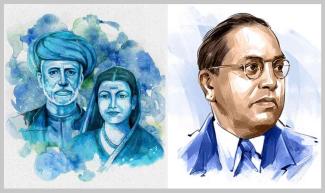
April 11 and 14 mark the birth anniversaries of two of India's greatest names in the battle for social equality - Jyotirao Phule and Babasaheb Ambedkar. This year we are celebrating the 197th birth anniversary of Phule (11 April 1827 - 28 November 1890) and the 133rd anniversary of Dr. Ambedkar (14 April 1891 - 6 December 1956). At a time when modern India is experiencing the most vicious assault on the constitutional foundation of the Indian Republic and an aggressive recrudescence of feudal patriarchal values and shackles, the messages of Phule and Ambedkar have become ever more pertinent and inspiring.
Progressive people across the world remember 1848 as the year of publication of the Communist Manifesto. The same year, a young Jyotirao (popularly known as Jyotiba) Phule, just 21 years old then, and his wife Savitribai Phule, who was only 17, started India's first school for girls at Bhidewada, Pune. This was also the year when Phule had read American philosopher Thomas Paine's book "Rights of Man" defending the French Revolution. This pioneering initiative to impart education to women and oppressed castes invited the wrath of the Manusmriti-abiding conservative upper-caste elite, and the Phules, ostracised even by their near and dear ones, could carry on their women's education campaign only with the exemplary backing of two of their Muslim friends, Fatima Sheikh and her brother Usman Sheikh.
This was the beginning of an iconic comradeship and a great chapter of social justice and women's education in the history of modern India. Women's education became a tool of women's empowerment, raising a strong voice against infanticide and for widow remarriage. In stark contrast to today's hypocritical 'beti bachao, beti padhao' jumla by blatantly misogynistic forces, this was the original and genuine campaign for women's education and equality that shook up a hostile feudal setting. In 1873 Phule wrote his seminal work 'Gulamgiri' against India's own order of social slavery called the caste system and dedicated the book to those fighting racialised slavery in America.
Phule passed away in 1890, just around the time Ambedkar was born. By the 1920s, the social justice movement had found a great new champion in Ambedkar who had returned to India after obtaining degrees in economics and law from the UK and the US. Ambedkar recognised Phule as his great teacher and source of inspiration next only to Buddha and Kabir. 1927 was the defining year when Ambedkar took two historic steps - the Mahad Satyagraha in March 1927 asserting the right to water as a public good without any discrimination, and the public burning of the Manusmriti in December 1927, denouncing it as a code of slavery. In 1936, Ambedkar issued his clarion call: 'annihilation of caste'. The same year he formed the Independent Labour Party which identified caste and capitalism as its twin targets.
The next two decades saw Ambedkar in bigger roles, shaping a series of radical ideas and initiatives as colonial India gained freedom and the Constituent Assembly adopted the Constitution of free India which Ambedkar had drafted as chair of its drafting committee. The adoption of the Constitution did not mark the end of Ambedkar's journey, the battle for justice and social equality continued on the basis of the newly adopted Constitution. The Hindu Code Bill aimed at modernising Hindu personal law to ensure equal rights for Hindu women was his last major battle before he took the final step of embracing Buddhism, exercising the religious freedom guaranteed in the Constitution to choose one's own religion.
Today in the face of India's most decisive electoral battle where the very future of India's constitutional democracy is at stake we need to draw every strength and inspiration from the radical legacy of Phule and Ambedkar. We must remember that Babasaheb Ambedkar not only gave us the Constitution and reservation, he also warned us about the ominous implications of bhakti in politics, which he called a sure recipe for dictatorship, and the great calamity that would hit us if Hindu Rashtra were to become a fact. While commemorating the birth anniversaries of Phule and Ambedkar let us remember the insightful words of Ambedkar and work with all our might to save the Constitution and the democratic future of India.
Charu Bhawan, U-90, Shakarpur, Delhi 110092
Phone: +91-11-42785864 | Fax:+91-11-42785864 | +91 9717274961
E-mail: info@cpiml.org







